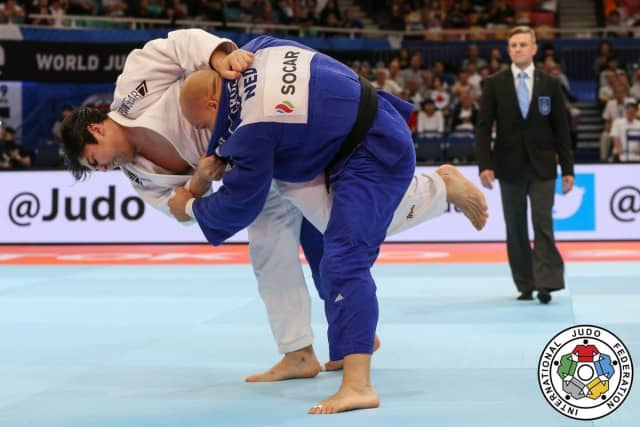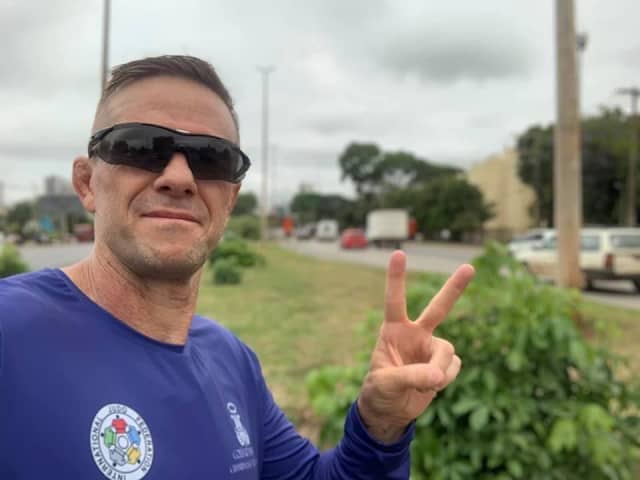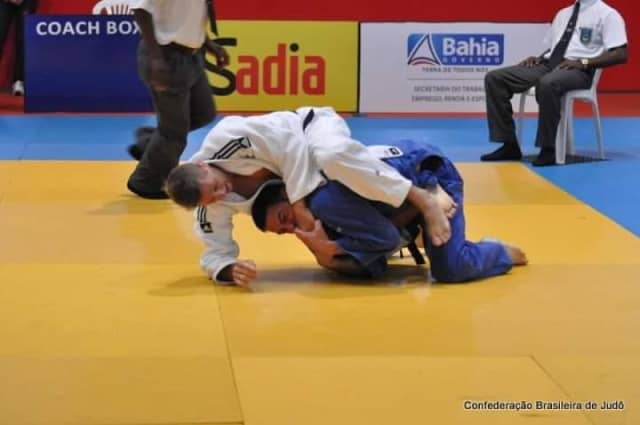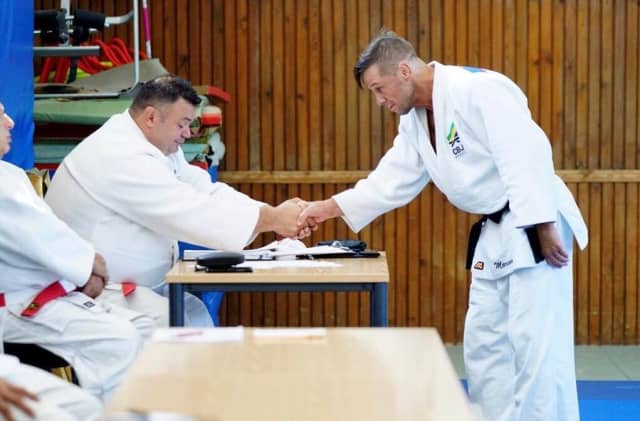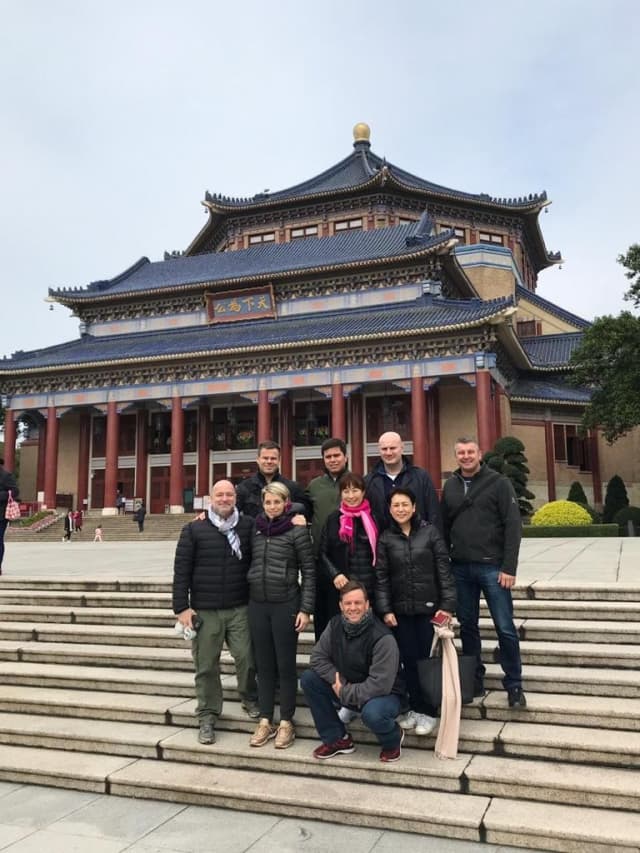Mariano is an IJF ‘A’ referee. Many won’t recall his face, they can’t quite place him. Mariano? Mariano? Hmm. Ah yes, now you’ve shown me his picture, I remember. His ability to disappear from view on the IJF World Judo Tour is part of what makes him a referee at the top of his game. He really is world class and with almost balletic movement around the tatami he does everything he can to keep the judoka safe, fairly adjudicated and otherwise uninterrupted.
He hails from Brasilia, the capital of Brazil, where he lives with his wife and fourteen year old daughter and their two adored dogs. Mariano holds the grade of 6th dan and admits to being a judo addict.
“During the pandemic I didn’t stop judo, as we have a public project for judo to continue with, we just had to do it differently. I also continue my own practice with kata and nage-komi. Just one training partner, Monday to Friday every week and we train once or twice per day. Samuel Souza is one of my students and so I coach him and also train with him. Some of the throws are not easy with our difference in build, but we train so much together that we can only get better.”
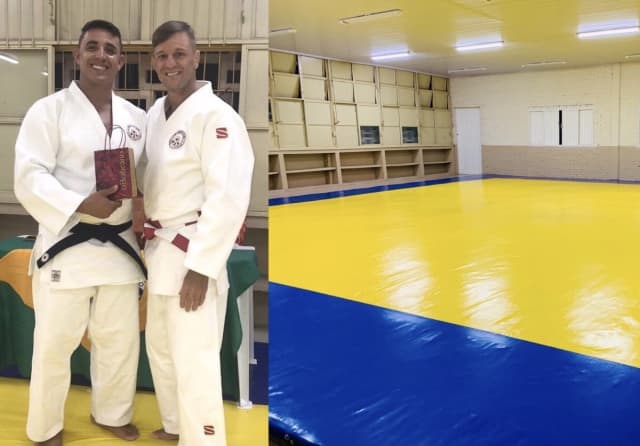
For Mariano this routine of daily training is not just about staying fit or doing a little coaching, it is much, much deeper than that; a way of life.
“Every month here there is a competition and during breaks from shiai, for cleaning and organisational purposes, I present nage-no-kata, every month. It is very important, the essence of judo, for me. Katame-no-kata is great for training too, but the nage-waza is the essence.”
Mariano keeps his judo knowledge and practice sharp but also embraces the philosophies and the wider lifestyle that judo encourages.
“This year I will do a half iron man. I had 4 knee surgeries in the past so the training has to be very strategic, to avoid re-injury. On Sunday morning, after my Covid test for travelling to Budapest, I trained a half marathon and I really looked forward to it, it’s excellent training for me. Here in Brasilia it is very hot, 34 degrees, even at 4pm. I usually practice the half marathon in around a time of 3-3.5 hours, but at 5am to avoid the most severe heat."
"I am a teacher of judo and I work in the government for the state secretary of education. Judo is free here for the young people, paid for by the government. I started in a school when I was 5 years old and I am still there now, but as a teacher. 17 years ago I started to work only in judo, for the government, in this school. It’s a big project. I still have many wonderful memories of teaching football and swimming. I am actually a physical education teacher.”
Mariano’s passion for health and for judo trickles into every word of his interview, “The body’s vocabulary of movement is so important for all of us. Some high level judo teachers still think judoka should only study judo, but we need to teach our bodies all of the movements and co-ordination we can. Physical preparation in a broad context is how we can succeed through injuries and through adversity of all kinds. I have to be honest with athletes, coaches, myself and most of all with the judo. It is important for me to continue working at a high level in my own training so that I can feel and see what is really happening on the tatami in front of me. It’s so important to pull the whole of judo together and understand the sport fully. To be honest doesn’t just mean to not tell lies, it can mean to have integrity and to do all we can to fulfill a role we love with the research, knowledge and practical application it deserves.
I still compete; so far I won the Veteran Championships of Brazil 3 times. To continue to train is vital and also to continue to challenge ourselves.”
Mariano’s energy carries him into every situation with focus and happiness, sometimes putting himself in seemingly unenviable positions.
“At the first IJF Academy Refereeing Seminar, in 2018, I completed my nage-waza and katame-waza exams and felt I did well. So then I became uke for 7 friends... 7!! They know I am prepared and that I am physically ready and of course I am happy to participate. Without jita kyoei we don’t have judo, but it is also necessary for the whole of life.
In my exam, monitored by the great Olympic champion Mark Huizinga (NED), for katame-waza I scored 9.5 out of 10. I asked him where I should improve to reach the big ten. He and I both smiled as he answered that 10 is reserved for Jigoro Kano. It really made me laugh but I appreciated it so much.
Mark then used me as uke for some demonstrations. I remember feeling the thunder of the yoko gake as a static technique, a moving technique and also in the kata. His nage-waza has so much power, it made the blood stop in my throat. What a great experience though, I will never forget it. At the end of the seminar I felt like my body had been through a real trial but I was so happy to have taken such a full role in every educational element.”
Covid has forced so much change for all of us. How does it affect someone as positive in outlook as Mariano is?
“At the beginning of the pandemic I was afraid. I’m not old or unwell but I have to consider my family and what could happen to us all, here and globally. Really though, I have good food and I train. I make sure I sleep well every day and maintain my health, but you know, I can see the situation broadly and so I stayed in the house for the first two months, with just food shopping outside, nothing else. I kept strictly to Brazilian sanitary regulations, although for all judoka this part should not be difficult. We have discipline.”
The Covid situation unfolded so fast and to such extremes, it took so many of us by surprise, having to catch up and adapt quickly to stay on top of our lives.
“My last World Judo Tour refereeing was in Düsseldorf, at the Grand Slam. After Germany and a short time at home, I arrived in Paris for my connection to Ekaterinburg, ready for a great experience in Russia, but in that short transfer window, in Paris, I checked my phone and couldn’t quite believe it; the Ekaterinburg Grand Slam was cancelled! I waited a short while in Paris, received a new ticket and turned around, straight back home. No problem, no upset, just learning straight away about some of the ramifications of the presence of this virus.
Now I have had 7 months in the house with my family. This is a spectacular situation. I saw very quickly that this was an opportunity to spend some unique moments with them. My heart feels how special this time is, despite all the upheaval and for some the grief. There have to be positives and I will always find them. But, now it is time to work again for international judo. We must work and keep going.”
Mariano is glad to have been able to stay in touch with judo throughout 2020, from his own training, both on and off the mats, to teaching courses, studying via webinars and watching hours and hours of video material associated with refereeing.
“I have been assisting with some teaching for black belt courses and exams. Through this period we have been teaching via Zoom, but just recently we received special permission from the government to teach face to face, with masks and all other Covid protocols in place. I have to help prepare course teachers as well as the students as many haven’t been able to practise so much these last months. To truly understand nage no kata you must practise it, so I have to work with teachers to ensure their practice and understanding is at the right level.
With training, revising my seminar notes, watching videos and many other judo activities, I really feel integrated with the contests when I’m refereeing. I have no doubt this will be the case in Budapest too, as normal. For me it’s marvellous, always a fantastic experience. I can feel when the athletes are competing, the timing of their transition stages, the appropriate time to call ‘matte;’ I really feel the timing.
Although I’ve not been able to work in the school and haven’t refereed for some time, I continue to study. The PJC organised weekly webinars and Mr Minakawa, the Director of Referees for Brazil was able to keep us involved in this way. For most events I was a participant but for a few I was also a co-teacher. I’ve also enjoyed programmes from IBSA; they have a lot to teach us too. All webinars were originally delivered in Spanish but after a few weeks, to facilitate the inclusion of North American countries, there was a dual language delivery: Spanish and English. We have covered so many elements of refereeing, using a lot of material from the IJF Refereeing and Coaching Seminar held in Doha in January, from the 2018 Academy Seminars and from experts. It’s been a great programme.
I also practise walking and triangulation on the tatami where I train with Samuel. I imagine real situations and watch videos. I think so much about the justice of contests, penalties and scores. I think about some of the specific moments that are maybe not quite covered by all the rules. I can’t let myself forget. One week without focus could be sufficient to forget something. I use visualisation techniques, just like judoka visualise their situations with opponents. It’s a useful tool.
It is not easy to be an IJF referee, we have such a huge responsibility. The first fight for a referee is as important as the first for any judoka. We also have to feel the arena, take the correct space and calm our nerves. It doesn’t matter if it is Maryama v. Abe or anyone else, the focus must be the same. We have a duty to put the right people through to the final block and if I want to go to the final block I must be at my best too.
Knowing I am ready, that I prepared consistently, the notice to referee in Hungary this weekend was a very welcome moment. When it arrived I said to myself that I don’t believe it, after so long. It felt a bit like a dream. I just said ‘thank you,’ in my mind.
Last year I had a high-speed motorbike accident and was told I would need a minimum of 3 months to recover. After 40 days I was working in Zagreb, at the Grand Prix. I couldn’t be away from judo tournaments for 3 months, it was impossible for me. So with a lot of work and care I pushed for Zagreb and judo helped me to get there and yet here we are with no motorbike accident, but more than double the time away from the arenas. It would have been unthinkable if someone had suggested this to me before Covid came."
"So I confirmed to myself, again, that my judo mission can continue. Working with referees and teachers of judo is a mission and a passion. It’s not only a job."
Mariano is in the air at this moment, having flown from Brasilia to São Paulo yesterday evening. He is now somewhere between São Paulo and Amsterdam, with a final short flight to connect him to Budapest this evening.
“Long flights are normal. No problem! This one will be very special. I am a mix of all emotions, but actually not nervous. I have had good preparation, so I am confident. It helps me so much.
I will hear ‘go to the edge and go to the mat’ and I will say some calming things to myself and just go. I have a ritual. I wake up and exercise and then breakfast. Then some quiet thinking time. I carry some spirit with me from my father, my first sensei and my students. To be grateful for this honourable life is a must. I arrive at every moment with an open heart, because I trust in our community and the true meaning of jita kyoei.

